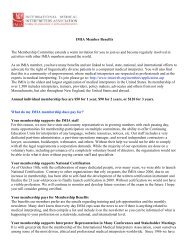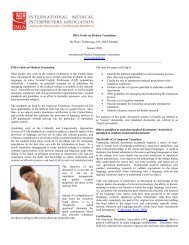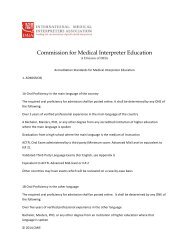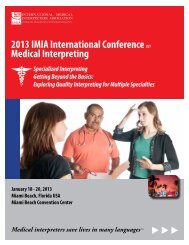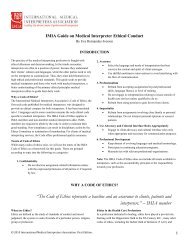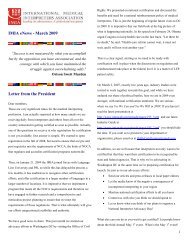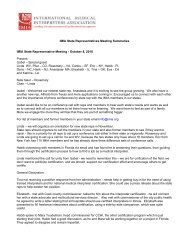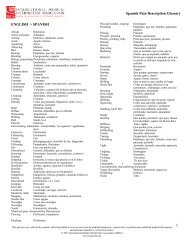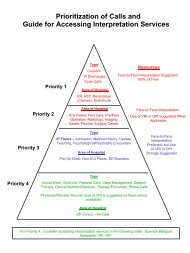improving the quality of mental health interpreting in victoria
improving the quality of mental health interpreting in victoria
improving the quality of mental health interpreting in victoria
Create successful ePaper yourself
Turn your PDF publications into a flip-book with our unique Google optimized e-Paper software.
Part One: Introduction and Background<br />
Introduction<br />
“Unmet language need is one <strong>of</strong> <strong>the</strong> key drivers <strong>of</strong> social exclusion…<br />
and <strong>in</strong>equity <strong>in</strong> access to services.”<br />
(Asp<strong>in</strong>all, 2005)<br />
Victoria is one <strong>of</strong> <strong>the</strong> most culturally and l<strong>in</strong>guistically diverse societies <strong>in</strong> <strong>the</strong> world. The<br />
Victorian State Government “recognises that <strong>the</strong> diverse cultural backgrounds, languages<br />
and abilities <strong>of</strong> Victorians provide some <strong>of</strong> <strong>the</strong> State’s greatest strengths.” To ensure that all<br />
members <strong>of</strong> <strong>the</strong> community are treated with fairness and respect, and can participate <strong>in</strong><br />
<strong>the</strong> State’s social <strong>in</strong>stitutions <strong>the</strong> Government has enunciated a number <strong>of</strong> clear pr<strong>in</strong>ciples,<br />
<strong>in</strong>clud<strong>in</strong>g hav<strong>in</strong>g <strong>in</strong> place systems and procedures that will enable all Victorians access to<br />
Government services and programs free from undue impediment, and ensur<strong>in</strong>g Government<br />
strategies and policies are responsive to all Victorians (Valu<strong>in</strong>g Cultural Diversity, VOMA,<br />
2002).<br />
Mental <strong>health</strong> services are among <strong>the</strong> most complex state services to deliver. The<br />
cont<strong>in</strong>u<strong>in</strong>g reality <strong>of</strong> stigma, <strong>the</strong> pressure <strong>of</strong> cont<strong>in</strong>ued <strong>in</strong>creas<strong>in</strong>g demand on area <strong>mental</strong><br />
<strong>health</strong> services, and <strong>the</strong> general social disadvantage and vulnerability <strong>of</strong> people with <strong>mental</strong><br />
illness who require <strong>the</strong>se services represent major challenges (M<strong>in</strong>as et al, 1996; Andary et<br />
al, 2003). For people who do not speak fluent English, and who come from a wide variety<br />
<strong>of</strong> cultural backgrounds, seek<strong>in</strong>g and receiv<strong>in</strong>g <strong>mental</strong> <strong>health</strong> care is frequently a<br />
bewilder<strong>in</strong>g experience. There is still very little accessible <strong>in</strong>formation <strong>in</strong> languages o<strong>the</strong>r<br />
than English about <strong>mental</strong> <strong>health</strong> and illness, about how to ga<strong>in</strong> access to services when<br />
<strong>the</strong>y are needed, and about what to expect <strong>of</strong> such services.<br />
In <strong>the</strong> cl<strong>in</strong>ical sett<strong>in</strong>g <strong>the</strong> key <strong>in</strong>strument for assessment and treatment is communication.<br />
In <strong>the</strong> absence <strong>of</strong> excellent communication between cl<strong>in</strong>ician, client and family, high <strong>quality</strong><br />
cl<strong>in</strong>ical work is impossible. Where <strong>the</strong>re are limits <strong>in</strong> <strong>the</strong> <strong>quality</strong> <strong>of</strong> communication<br />
assessment <strong>of</strong> <strong>the</strong> nature and severity <strong>of</strong> <strong>the</strong> <strong>mental</strong> <strong>health</strong> problem, and assessment <strong>of</strong><br />
risk, will be superficial, frequently <strong>in</strong>complete and sometimes dangerously wrong. Where<br />
<strong>the</strong> client has a limited understand<strong>in</strong>g <strong>of</strong> <strong>the</strong> explanations given by cl<strong>in</strong>icians and <strong>of</strong><br />
treatment recommendations, <strong>the</strong> <strong>quality</strong> <strong>of</strong> engagement <strong>of</strong> <strong>the</strong> client <strong>in</strong> <strong>the</strong> <strong>the</strong>rapeutic<br />
process will be constra<strong>in</strong>ed. Provision <strong>of</strong> services that are dependent on excellent<br />
communication, such as psycho<strong>the</strong>rapeutic methods, rehabilitation, etc., will be essentially<br />
impossible and <strong>the</strong> <strong>the</strong>rapeutic options are limited to prescription <strong>of</strong> psychotropic<br />
medic<strong>in</strong>es.<br />
For many people requir<strong>in</strong>g <strong>the</strong> assistance <strong>of</strong> Victoria’s <strong>mental</strong> <strong>health</strong> services<br />
communication with cl<strong>in</strong>icians is possible only with <strong>the</strong> assistance <strong>of</strong> pr<strong>of</strong>essional<br />
<strong>in</strong>terpreters.<br />
Whilst <strong>the</strong> Victorian <strong>mental</strong> <strong>health</strong> system has taken a lead<strong>in</strong>g role <strong>in</strong> respond<strong>in</strong>g to<br />
cultural and l<strong>in</strong>guistic diversity <strong>in</strong> <strong>the</strong> provision <strong>of</strong> services, <strong>the</strong>re are cont<strong>in</strong>u<strong>in</strong>g difficulties<br />
experienced by people from culturally and l<strong>in</strong>guistic diverse backgrounds (CALD) <strong>in</strong><br />
8




